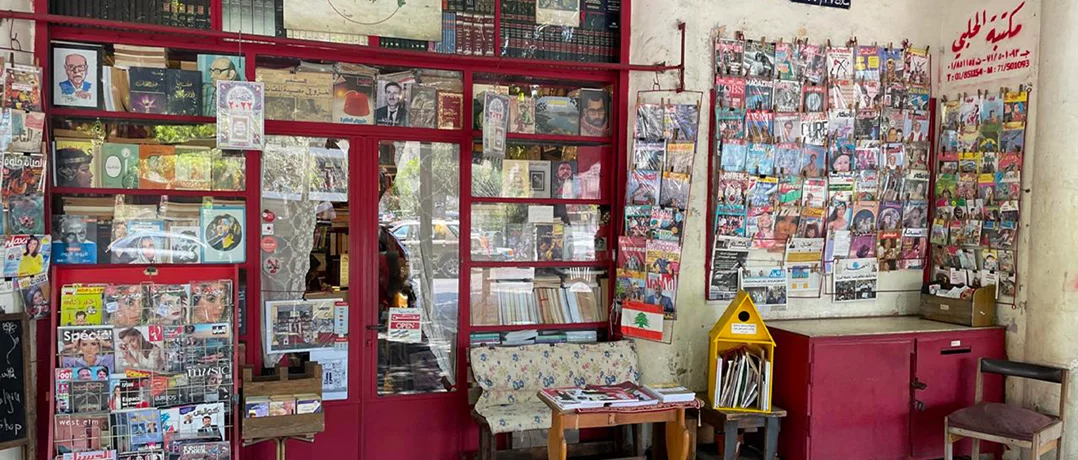In Tarik Al Jdide, one of Beirut’s oldest bookshops continues to outlast wars, crises, and digital shifts, a home where stories, memory, and paper still breathe.
Halabi Bookshop: A legacy still turning pages in Beirut
Halabi Bookshop: A legacy still turning pages in Beirut


On a tranquil street not far from Beirut, the noise of the city turns into something that is older at Tarik Al Jdide.
Halabi Bookshop is a place where the sun peeks through tiny, narrow windows, and it is only a small part of the book stack that gets the light. The air has a faint aroma of dust and ink, the same as that of the old paper.
The wooden shelves are already full of stories. A kettle in the back sips. And with the creaking of the floorboards, one can almost catch the whispers of centuries that are turning their pages.
A family’s legacy between pages
This is a bookshop that dates back to very early times in the city, surviving wars, trends, and the digital age throughout its 65 years of existence. Abdullah Halabi started the shop, selling just newspapers and magazines at a small kiosk, and little by little, through its consumption, it turned into a great library. Now, it is the property of his children, Karim and Lana Halabi, who quit their jobs in 2016 to resuscitate the family legacy.
“When we first reopened the shop, you couldn’t even walk inside,” Karim recalls. “All the books were on the floor, and nothing was organized. My sister and I decided to take the risk, renovate it, and keep our father’s dream alive.”
Their father, Abdullah, had once hoped to build a public library, a space open to everyone. “The Ministry never had that vision,” Karim says.
So, we did it ourselves. It’s our father’s job, his legacy, and it has to stay alive.
A home for readers
The Halabi Bookshop, which is now regarded as both a business and a cultural center, has changed the world of books. It is a dynamic repository of Beirut's literary rhythm, a space where people engage in conversation that flows as easily as coffee, and feel welcome rather than merely finding stories on the bookshelves.
“When people come here, they say it feels like home,” Karim smiles.
There are carpets, wooden desks. It’s not just a store, it’s a home library. You come to our house to see this library.
The shop’s offerings stretch across three languages, Arabic, French, and English, and include everything from politics and philosophy to poetry, children’s stories, and rare editions. It’s also a platform for Lebanese creators to collaborate, like Café Younes, and small-business collaborations fill the nooks between the novels.
“Our mission,” Karim says, “is to make books and literature readable again in Lebanon.” Through book clubs, storytelling sessions for children, and author meetups, the siblings have turned the space into a cultural microcosm of Beirut. “Music events are popular here,” he adds, “but cultural events with books, not so much. We wanted to change that.”
And yet, amid the noise of modern life, Halabi Bookshop has remained remarkably true to its original rhythm. Even during Lebanon’s hardest moments, the civil war, the Beirut explosion, the economic crisis, its doors never shut. “We stayed open during every war,” Karim says. “People needed to know what was happening. We sold daily newspapers; we posted headlines every morning. We survived everything.”
That resilience, quiet but unwavering, has earned the bookshop a devoted following. “We have loyal readers, students, artists, politicians,” Karim says. “Even tourists find us on Google. We’re small, but our operation is big.” On Instagram, where Halabi posts daily photos of newspapers and book recommendations to over 29,000 followers, the digital presence remains just as intimate. “Everything we share is real,” he says. “No filters, no agencies, just us. What you see online is what you see when you walk in.”
Still turning pages in Beirut
For Karim, the shop has become inseparable from his own identity. “The library is part of me,” he says simply. “I grew up here. I used to help my dad sell newspapers and watch how he worked. Now I know every single book on these shelves.”
He speaks with particular warmth about the children’s corner, one of the bookshop’s proudest initiatives. “We care a lot about children’s literature,” he says. “When you put a book in front of a child, they grow up seeing that it’s valuable. Reading from a young age builds culture.”
In a city constantly reinventing itself, Halabi Bookshop remains a reminder of what endures, the weight of a page, the mark of a fingertip, the comfort of paper that doesn’t vanish with a swipe. “When you hold a book,” Karim says, “it has a patina, something the phone will never give you. On a screen, you scroll and forget. But a book stays with you. You can touch the sentence you loved.”
Today, the siblings continue to expand their father’s dream: digitizing archives, shipping books worldwide, and curating boxes filled with novels, mugs, and candles for readers abroad. They’ve even begun donating books to NGOs and schools, building mini libraries across Lebanon.
“We’ve gone through everything and we’re still standing,” Karim says. “This shop is more than business. It’s Beirut, its memory, its resilience, its contradictions. It’s a home for anyone who still believes in words.”


.webp)